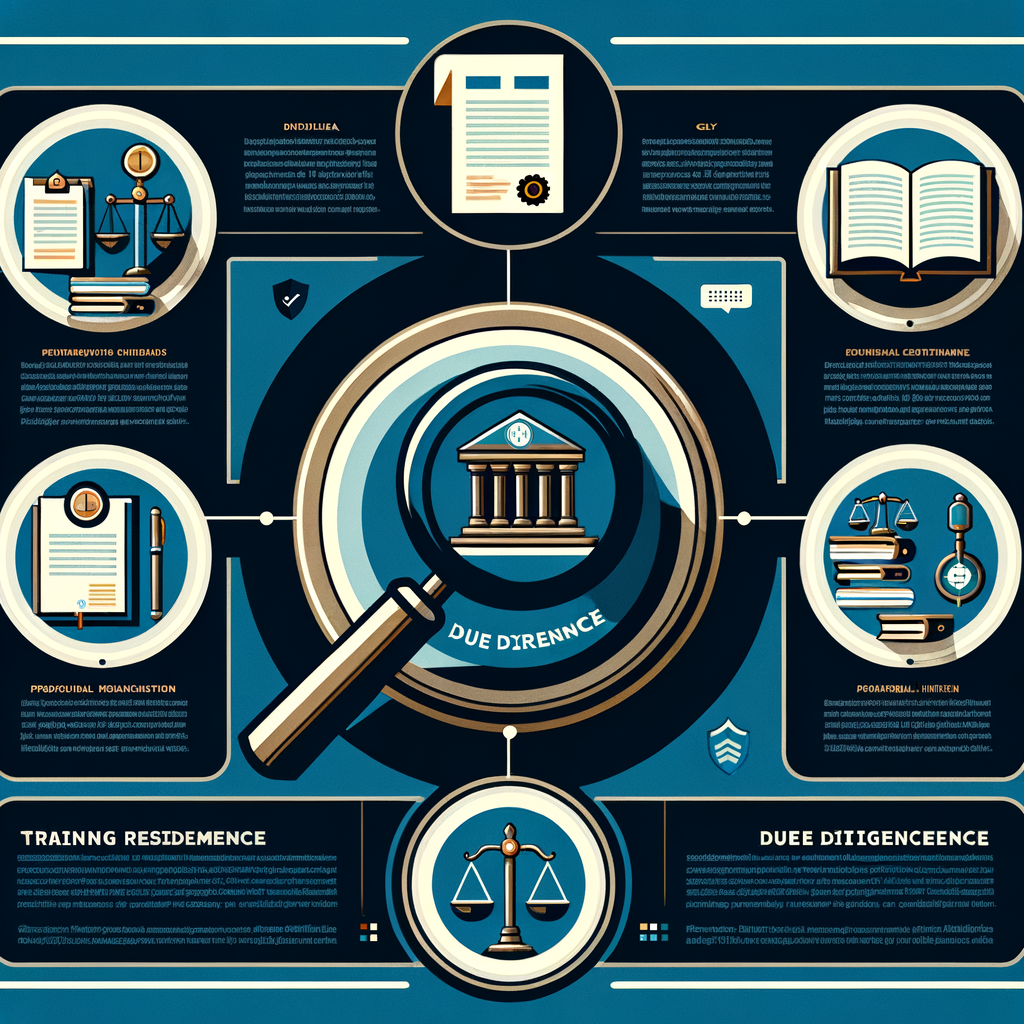What Training is Recommended for Professionals Conducting Due Diligence in India?
Imagine this: a small business owner, excited about growth, decides to acquire a key supplier. The deal seems perfect on the surface. However, a few months later, they receive a massive notice for unpaid taxes inherited from the acquired company—a hidden liability that was never uncovered. This costly mistake, a prime example of What are the most common reasons for business failure?, could have been avoided with a thorough investigation. In the world of business, this crucial investigation is known as due diligence. In India’s dynamic and complex market, simply relying on instinct or surface-level checks is a recipe for disaster. This is where formal due diligence training becomes not just an advantage, but a necessity for making sound, data-backed decisions and mitigating significant financial and legal risks. This guide will walk you through the essential skills, key areas of focus, and the specific due diligence training programs India offers to equip professionals and business owners for success.
Why is Formal Due Diligence Training Crucial for Indian Professionals?
Understanding the ‘why’ behind formal training is the first step toward appreciating its immense value. In a business environment filled with opportunities and hidden pitfalls, structured knowledge is your best defense and most powerful tool. It transforms due diligence from a simple checklist into a strategic process that uncovers value, quantifies risk, and provides a solid foundation for any major business decision, whether it’s an acquisition, a major investment, or a strategic partnership.
Moving Beyond a ‘Gut Feeling’ to Data-Driven Decisions
Instinct and experience are valuable, but they cannot replace a systematic, evidence-based approach. Formal training provides a structured framework for conducting investigations, ensuring no stone is left unturned. It teaches you how to move beyond the provided information and ask the right questions, probe for inconsistencies, and connect seemingly unrelated data points to form a complete picture of the target entity. The best practices in due diligence training focus on creating a repeatable and robust methodology. This includes learning how to design a comprehensive due diligence checklist, how to prioritize areas of risk based on the nature of the transaction, and how to quantify potential liabilities so they can be factored into the valuation or negotiation process. This data-driven approach removes emotion and guesswork, replacing them with objective analysis and a clear assessment of the risks and rewards.
Navigating India’s Complex Regulatory Landscape
India’s regulatory environment is a complex web of central, state, and local laws that are constantly evolving. For any professional conducting due diligence, a deep understanding of this landscape is non-negotiable. A misstep in compliance can lead to severe penalties, legal disputes, and reputational damage. Proper training covers the critical legal frameworks that govern business operations in India, including the Companies Act, 2013, for corporate governance and filings, the Foreign Exchange Management Act (FEMA) for transactions involving foreign currency, SEBI regulations for listed companies, and the intricate tax laws like GST and Income Tax. A comprehensive training program ensures you know what to look for, where to look for it (such as MCA records or GST filings), and how to interpret the findings to assess the target’s compliance posture, ultimately preventing the buyer or investor from inheriting unforeseen legal liabilities.
Building Credibility and Gaining a Competitive Edge
In the high-stakes world of mergers, acquisitions, and investments, trust and credibility are paramount. When you or your team can demonstrate a certified proficiency in due diligence, it sends a powerful message to investors, lenders, potential partners, and clients. It shows that you are committed to professionalism and thoroughness. For salaried individuals, undergoing due diligence training for professionals in India can significantly enhance your career prospects, opening doors to roles in corporate finance, investment banking, and consulting. For business owners, it equips you to engage more effectively with advisors and make more informed final decisions. This certified expertise becomes a competitive advantage, distinguishing you from others and building the confidence necessary to close deals successfully.
Key Areas Covered in Comprehensive Due Diligence Training
A high-quality due diligence course is not a superficial overview; it is a deep dive into the critical pillars that support a business. Understanding these core components helps you evaluate potential due diligence training programs and ensures you acquire a holistic skill set. A thorough investigation dissects a company into its financial, legal, tax, and operational parts to assess the health of the whole. Each area requires a unique lens and a specific set of skills to analyze correctly, and a good training program will equip you with the tools for each.
Financial Due diligence
This is often the heart of the investigation. Knowing How do you conduct financial due diligence for a merger or acquisition? goes far beyond simply reading the profit and loss statement. It involves a critical analysis of a company’s financial health, performance, and historical trends. A robust training module will teach you how to meticulously scrutinize financial statements—the Profit & Loss, Balance Sheet, and Cash Flow Statement—to verify the quality of earnings and the sustainability of revenue streams. You will learn to assess the quality of assets, understand the nature and terms of existing debt and liabilities, and analyze working capital requirements. The actionable insight here is learning to spot red flags that aren’t immediately obvious, such as aggressive revenue recognition policies, off-balance-sheet liabilities, inconsistent cash flow patterns, or an over-reliance on a single customer, which could pose a significant risk post-transaction.
Legal and Statutory Due Diligence
Understanding What are the key components of legal due diligence? is the process of identifying and assessing all potential legal risks and liabilities associated with a company. This involves a comprehensive review of all corporate records, including articles of association, statutory registers, and minutes of board meetings. Training in this area covers the detailed examination of all material contracts with customers, suppliers, and employees; verifying the ownership and status of critical assets like property and equipment; and scrutinizing all necessary licenses and permits required to operate legally. A crucial part of this is reviewing the company’s intellectual property rights (trademarks, patents) and any ongoing or potential litigation history. A key practical skill you’ll learn is how to check for statutory compliance by verifying filings with the Ministry of Corporate Affairs (MCA) portal and confirming timely returns on the GST Portal, ensuring the company has met its obligations for Provident Fund (PF) and Employee State Insurance (ESI).
Tax Due Diligence
Given the complexity of India’s tax system, this is an area where hidden liabilities frequently lurk. Tax due diligence involves a thorough review of the target company’s historical tax compliance for both direct taxes (Income Tax) and indirect taxes (GST, and previously VAT/Service Tax). A specialized training module will teach you how to assess tax filings, review past tax assessments and disputes, and analyze the company’s tax positions on contentious issues. The most critical insight gained here is understanding how to identify potential tax liabilities, interest, or penalties that have not yet been levied by tax authorities but could become the responsibility of the new owner after the transaction is complete. This includes checking for compliance with TDS (Tax Deducted at Source) provisions and ensuring that all tax obligations have been accurately calculated and paid, which can be cross-verified on the Income Tax Department website.
Operational and Commercial Due Diligence
While financials and legal compliance tell part of the story, operational due diligence tells you if the business model itself is sound and sustainable. This facet of the investigation evaluates the target company’s position within its market, its operational efficiency, its key customer and supplier relationships, and its underlying technology infrastructure. Effective due diligence skills training India provides frameworks to analyze the competitive landscape, assess the strength of the management team, and understand the core processes that drive the business. You will learn to evaluate the risks associated with customer concentration, supply chain dependencies, and technological obsolescence. This helps the acquirer or investor understand not just the company’s past performance, but also its future prospects for growth and profitability in the real world.
Finding the Right Due Diligence Courses and Certifications in India
Once you recognize the need for training, the next step is to find a program that fits your career goals, schedule, and budget. India offers a diverse range of options, from highly respected professional certifications to flexible online courses and intensive workshops. Choosing the right one depends on your specific objectives, whether you’re seeking a formal qualification to boost your resume or practical skills to apply immediately in your business.
Certifications from Professional Bodies (ICAI, ICSI)
For those seeking the highest level of credibility and industry recognition, certifications from India’s premier professional bodies are the gold standard. The Institute of Chartered Accountants of India (ICAI) and the Institute of Company Secretaries of India (ICSI) offer post-qualification courses and certificate programs specifically focused on due diligence, mergers and acquisitions, and corporate restructuring. These programs are rigorous, comprehensive, and highly respected by employers and clients alike. Obtaining a due diligence certification India from one of these institutions signals a deep level of expertise and a commitment to the highest professional standards, making it an invaluable credential for CAs, CSs, and finance professionals looking to specialize in this field.
Online Due Diligence Training India: Flexibility and Access
The rise of ed-tech has made high-quality education more accessible than ever. For professionals and business owners with demanding schedules, online due diligence training India offers a flexible and cost-effective alternative. Platforms like Coursera, Udemy, and LinkedIn Learning host courses from international universities and experts, while specialized Indian platforms like LawSikho offer programs tailored to the Indian legal and business context.
| Feature | Online Platforms (e.g., Coursera, Udemy) | Professional Body Certifications (ICAI, ICSI) |
|---|---|---|
| Flexibility | High (self-paced, on-demand) | Moderate to Low (structured schedule, exams) |
| Cost | Low to Moderate | High |
| Recognition | Varies by provider | Very High (Industry standard) |
| Depth of Content | Generally foundational to intermediate | Comprehensive and in-depth |
| Networking | Limited (online forums) | High (peer groups, professional network) |
While online courses provide excellent foundational knowledge and convenience, they may sometimes lack the practical depth and networking opportunities offered by professional body certifications.
Intensive Due Diligence Training Workshops
For those who learn best by doing, due diligence training workshops in India are an excellent option. These are typically short, intensive programs (ranging from one day to a week) conducted by seasoned industry experts, senior partners from large consulting firms, or specialized training institutes. The primary focus of these workshops is on practical application through real-world case studies, hands-on exercises, and interactive sessions. They are ideal for professionals who want to quickly acquire practical, actionable skills they can immediately apply to their work. These workshops are fantastic for bridging the gap between theoretical knowledge and the complexities of executing a due diligence exercise in a live transaction.
Evaluating Recommended Due Diligence Courses in India
With so many options available, choosing the right one can be daunting. When evaluating the recommended due diligence courses India has to offer, use this checklist to make an informed decision:
- Comprehensive Curriculum: Does the course cover all key areas—financial, legal, tax, and operational due diligence? Ensure the syllabus is detailed and relevant to the Indian context.
- Instructor Credibility: Who is teaching the course? Look for instructors with significant, real-world experience in mergers and acquisitions, corporate law, or investment banking.
- Practical Application: Does the program include practical case studies, real-life examples, and hands-on exercises? Theory is important, but the ability to apply it is what truly matters.
- Industry Recognition and Reviews: What do past participants say about the course? Check for testimonials and reviews. Is the certification recognized and valued by employers in your field?
Conclusion
In the intricate landscape of Indian business, due diligence is a critical, non-negotiable skill. It is the bedrock of sound investment decisions, successful acquisitions, and sustainable growth. Moving past guesswork and embracing a structured, analytical approach is essential for mitigating risk and unlocking true value. The most reliable path to mastering this discipline is through formal education. Investing in the right due diligence training is an investment in yourself and your business’s future. It equips you with the framework to navigate complex regulations, analyze financial intricacies, and make strategic decisions with confidence, ensuring you are protected and primed for success in the competitive Indian market.
Navigating a major business transaction? Don’t leave it to chance. Contact TaxRobo’s expert team today for comprehensive due diligence services that safeguard your interests and pave the way for successful growth.
Frequently Asked Questions (FAQs)
Q1: Who needs due diligence training?
A: It’s highly recommended for Chartered Accountants, Company Secretaries, lawyers, finance managers, investment analysts, and small business owners involved in mergers, acquisitions, or significant investments.
Q2: Is a due diligence certification mandatory in India?
A: While not legally mandatory to perform due diligence, a certification adds immense credibility, showcases expertise, and is often preferred by clients and employers.
Q3: How much do due diligence training programs in India cost?
A: Costs vary widely. Online courses can range from a few thousand rupees to more comprehensive professional certifications costing upwards of ₹50,000, depending on the provider and depth of the curriculum.
Q4: What is the most important skill learned in this training?
A: While financial analysis is key, the most critical skill is critical thinking—the ability to connect disparate pieces of information to see the bigger picture and identify underlying risks that aren’t immediately obvious on paper.



